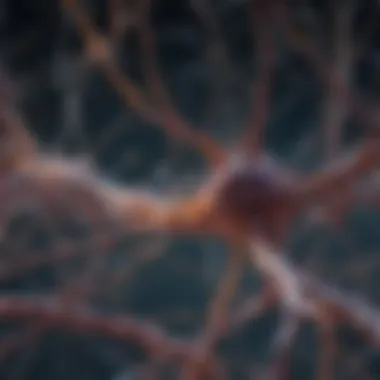Unveiling the Intricacies of the Human Mind: A Deep Dive into Mental Complexity


Understanding Resilience, Well-Being, and Adaptability
In grasping the complexities woven within the tapestry of the human mind, it is imperative to first navigate the terrain of resilience, well-being, and adaptability. These pillars of psychological fortitude form the bedrock upon which our capacity to thrive and evolve is built. Dive with me into an introductory journey elucidating the essence of resilience, well-being, and adaptability. We will chart the significance of these elements not only in individual growth but also in the holistic development of organizations. By deciphering the strategies that underpin the cultivation of resilience and well-being, we unlock vital insights that can fortify our mental edifices in the face of life's myriad challenges and opportunities.
Integration of AI Technology in Coaching
Transitioning from the intrinsic facets of human psychology, let us now pivot towards the integration of artificial intelligence (AI) technology in the realm of coaching. Explore with me the landscape of AI-driven coaching solutions, where the amalgamation of cutting-edge technology and human expertise redefines the paradigms of personal and professional development. Delve into real-world case studies that illuminate the transformative impact of AI technology on individuals and organizations, highlighting the tangible benefits reaped from this symbiotic relationship. By immersing ourselves in the potentials and possibilities that AI presents in the coaching domain, we unravel a tapestry woven with innovation, efficiency, and optimal outcomes.
Leveraging Behavioral Science for Personal Growth
As we navigate further into the labyrinth of the mind, we encounter the illuminating principles of behavioral science that hold the key to unlocking our fullest potential. Embark on a journey of discovery as we acquaint ourselves with the foundational tenets of behavioral science and unearth their practical applications in personal development. Explore the nuanced techniques designed to augment well-being and productivity through the lens of behavioral science, offering a roadmap towards self-actualization and enhanced effectiveness. By incorporating these evidence-based strategies into our daily lives, we pledge allegiance to a trajectory of growth, fulfillment, and holistic well-being.
Interactive Tools for Self-Improvement
Our voyage culminates in an exploration of interactive tools designed to catalyze personal growth and transformation. Delve into the array of user-friendly tools nestled within the digital realm, poised to empower individuals in their quests for resilience, adaptability, and well-being. Unearth the nuances of effective tool utilization as we uncover testimonials highlighting the metamorphic impact of interactive platforms on driving behavioral change and sustainable progress. By embracing these interactive mechanisms with fervor and intentionality, we embark on a path paved with self-discovery, introspection, and steadfast personal evolution.
Understanding the Mental Mind
This section of the article delves into the intricate realm of the human mind, unraveling the complexities that define our inner workings and influence our perceptions, behaviors, and overall well-being. Understanding the Mental Mind is crucial as it provides insights into how cognitive processes and emotional dynamics shape our mental landscapes. By exploring the nuances of our inner workings, we can enhance our self-awareness, stress management capabilities, decision-making skills, and social interactions. This section aims to highlight the importance of delving into the depths of the human mind to optimize personal development and well-being.
Exploring Cognitive Function
The Role of Memory
Delving into The Role of Memory is essential as it serves as a cornerstone of cognitive function. Memory plays a pivotal role in storing and retrieving information, shaping our perceptions and behaviors. The key characteristic of Memory lies in its ability to encode, store, and recall information, influencing our learning processes and daily functioning. Understanding The Role of Memory provides valuable insights into how we process and retain crucial information, enhancing our decision-making abilities and problem-solving skills.
Attention and Focus
Exploring Attention and Focus unveils their significance in regulating cognitive processes. Attention acts as a cognitive filter, directing our focus towards relevant stimuli while inhibiting distractions. The key characteristic of Attention lies in its role in information processing and enhancing task performance. Focus, on the other hand, determines the depth of cognitive processing and engagement with stimuli. Both Attention and Focus are pivotal in goal-directed behavior, learning, and memory consolidation.
Decision-Making Processes
Analyzing Decision-Making Processes sheds light on the cognitive mechanisms underlying choices and actions. Decision-making involves evaluating options, predicting outcomes, and selecting optimal solutions. The key characteristic of Decision-Making Processes is their impact on behavior and goal attainment. Understanding decision-making aids in effective problem-solving, risk assessment, and future planning. Examining the complexities of Decision-Making Processes enhances our ability to make informed and strategic decisions.
Analyzing Emotional Patterns


Emotional Intelligence
Exploring Emotional Intelligence delves into our capacity to recognize, manage, and express emotions effectively. Emotional Intelligence influences relationships, decision-making, and stress management. The key characteristic of Emotional Intelligence lies in its role in enhancing empathy, communication, and interpersonal skills. Developing Emotional Intelligence fosters emotional resilience, social competence, and adaptability in various situations.
Emotion Regulation Strategies
Understanding Emotion Regulation Strategies is pivotal in managing emotional responses and coping with stressors. Emotion regulation techniques assist in modulating intense emotions, promoting well-being and mental health. The key characteristic of Emotion Regulation Strategies is their efficacy in enhancing emotional self-regulation and reducing negative affect. Implementing strategies like cognitive reappraisal and mindfulness cultivates emotional stability and psychological flexibility.
Understanding Behavioral Responses
Examining Behavioral Responses uncovers the link between emotions and actions, shedding light on how we express and communicate feelings. Behavioral responses are influenced by cognitive processes, emotions, and social contexts. The key characteristic of Behavioral Responses is their role in adaptive functioning, conflict resolution, and social interactions. Understanding the intricacies of Behavioral Responses empowers us to navigate interpersonal dynamics, enhance communication skills, and build healthier relationships.
Examining Neural Pathways
Neuroplasticity
Delving into Neuroplasticity reveals the brain's capacity to reorganize and adapt in response to experiences and learning. Neuroplasticity underlies learning, memory formation, and recovery from brain injuries. The key characteristic of Neuroplasticity is its role in shaping behavior, cognition, and neural development. Understanding Neuroplasticity offers insights into brain function and the potential for cognitive enhancement through targeted interventions.
Synaptic Connections
Exploring Synaptic Connections elucidates the neural connections that facilitate communication between brain cells. Synaptic connections enable information transfer and signal relay, vital for cognitive processes and motor function. The key characteristic of Synaptic Connections lies in their modifiability and influence on neural communication efficiency. Studying Synaptic Connections enhances our understanding of learning mechanisms, neural plasticity, and brain health.
Brain-Body Interactions
Analyzing Brain-Body Interactions uncovers the interconnectedness between the brain and bodily systems, shaping physical and mental health outcomes. Brain-body interactions regulate stress responses, immune function, and emotional well-being. The key characteristic of Brain-Body Interactions is their impact on homeostasis, resilience, and overall health. Understanding the bidirectional communication between the brain and body is integral to promoting holistic well-being and optimizing self-regulation.
Impacts on Mental Well-Being
Stress and Coping Mechanisms
Fight-or-Flight Response
The Fight-or-Flight Response is a fundamental mechanism deeply intertwined with our innate survival instincts. In the face of perceived threat or danger, this response triggers a cascade of physiological reactions to prepare the body to confront or flee from the perceived harm. Understanding the Fight-or-Flight Response is crucial as it elucidates the body's adaptive mechanisms in the face of stressors, enhancing our survival chances.
Cognitive Behavioral Techniques


Cognitive Behavioral Techniques encompass a range of psychotherapeutic interventions that aim to modify maladaptive thoughts, emotions, and behaviors. By emphasizing the interconnectedness between cognition, emotions, and behaviors, these techniques empower individuals to restructure negative thought patterns and foster adaptive coping strategies. Incorporating Cognitive Behavioral Techniques equips individuals with invaluable tools to manage stress, enhance problem-solving skills, and promote psychological well-being.
Mindfulness Practices
Mindfulness Practices involve cultivating present-moment awareness and non-judgmental acceptance of one's thoughts, emotions, and sensations. By fostering mindfulness, individuals can develop a heightened sense of self-awareness, regulate their emotions more effectively, and cultivate a sense of inner calm amidst life's challenges. Integrating Mindfulness Practices into daily routines cultivates emotional resilience, attentiveness, and overall psychological well-being.
Anxiety and Its Manifestations
Types of Anxiety Disorders
Exploring the diverse spectrum of anxiety disorders is essential in understanding the multifaceted nature of anxiety and its nuanced manifestations. From generalized anxiety disorder to panic disorder, each subtype exhibits unique symptomatology and diagnostic criteria, necessitating tailored therapeutic approaches. Distinguishing between various anxiety disorders enables targeted interventions that address specific symptoms and mitigates the impact of anxiety on individuals' daily functioning.
Symptomatology and Treatment
Delving into the pervasive symptoms of anxiety disorders unveils the debilitating impact of excessive worry, fear, and physiological arousal on individuals' mental health. Treatment modalities ranging from pharmacotherapy to psychotherapy offer viable avenues for symptom management and recovery. By acknowledging the interplay of biological, psychological, and environmental factors in anxiety disorders, effective therapeutic strategies can be implemented to alleviate distress and restore psychological well-being.
Psychological Factors
A comprehensive exploration of psychological factors contributing to anxiety illuminates the intricate interplay of cognitive biases, conditioning processes, and interpersonal dynamics in fostering anxiety disorders. By addressing cognitive distortions, maladaptive beliefs, and underlying emotional conflicts, individuals can gain insights into the root causes of their anxiety symptoms. Analyzing psychological factors not only enhances awareness of internal processes but also informs personalized treatment plans tailored to individuals' unique psychological profiles.
Depression and Mental Health
Etiology of Depression
Unraveling the complex etiology of depression requires a holistic examination of genetic predispositions, neurobiological imbalances, and psychosocial stressors that influence the onset and course of depressive symptoms. By identifying the interconnected factors contributing to depression, healthcare professionals can devise comprehensive treatment plans that target underlying mechanisms and promote long-term recovery. Recognizing the multifaceted nature of depressive disorders underscores the importance of a multidimensional approach to diagnosis and intervention.
Impact on Daily Functioning
The profound impact of depression on daily functioning encompasses a spectrum of challenges, ranging from disruptions in work performance and social relationships to impaired cognitive functioning and self-care neglect. Understanding the pervasive nature of depressive symptoms enables healthcare providers to tailor interventions that address individuals' functional impairments and enhance quality of life. Assessing the impact of depression on diverse domains of daily functioning informs the development of targeted interventions aimed at restoring individuals' functional capacity and overall well-being.
Therapeutic Interventions
Exploring the array of therapeutic interventions for depression unveils diverse treatment modalities, including pharmacological, psychotherapeutic, and lifestyle-based approaches. By integrating evidence-based interventions such as cognitive-behavioral therapy, antidepressant medications, and holistic wellness practices, individuals can access comprehensive care that addresses the multifaceted nature of depression. Implementing tailored therapeutic interventions empowers individuals to navigate their unique healing journey, acquire coping skills, and foster resilience in the face of adversity.
Harnessing the Power of the Mind


Cultivating Mental Resilience
Adaptability and Flexibility
Within the discourse on Cultivating Mental Resilience lies the fundamental aspect of Adaptability and Flexibility. This pillar of mental resilience underscores the necessity of adapting to varied circumstances and cultivating a flexible mindset. The key characteristic of Adaptability and Flexibility lies in its capacity to facilitate rapid adjustments and proactive responses to changing environments. Adapting to new challenges and embracing flexibility as a core trait can immensely benefit individuals seeking to bolster their mental resilience. Despite its numerous advantages, challenges may arise in maintaining a delicate balance between adaptability and stability, a topic that this article delves into with a keen eye for detail.
Positive Psychology Practices
The section on Positive Psychology Practices elaborates on the significance of incorporating positivity into mental resilience strategies. This aspect places emphasis on leveraging positive emotions, strengths, and virtues to enhance well-being and resilience. The key characteristic of Positive Psychology Practices revolves around fostering a constructive mindset and promoting optimism in the face of adversity. By integrating positive psychology principles into daily routines, individuals can cultivate resilience and fortitude in navigating life's complexities. Although universally acclaimed for its benefits, some individuals may find challenges in consistently embracing positivity amidst life's challenges, an aspect that this article scrutinizes thoughtfully.
Growth Mindset Development
In the realm of mental resilience, Growth Mindset Development emerges as a transformative concept that amplifies personal growth and adaptability. This section highlights the intrinsic value of cultivating a growth-oriented mindset, characterized by a belief in continual improvement and learning. The key characteristic of Growth Mindset Development lies in its ability to foster resilience through embracing challenges as opportunities for growth. By nurturing a growth mindset, individuals can enhance their capacity to overcome obstacles and thrive in dynamic environments. While the advantages of a growth mindset are profound, individuals may encounter obstacles in shifting from a fixed mindset to a growth-oriented perspective, a theme that this article undertakes to explore thoroughly.
Enhancing Cognitive Abilities
Brain Training Techniques
The discourse on Enhancing Cognitive Abilities unveils the pivotal role of Brain Training Techniques in optimizing mental function. This segment magnifies the significance of targeted practices and exercises designed to sharpen cognitive faculties. The key characteristic of Brain Training Techniques lies in their ability to improve memory, focus, and problem-solving skills. By engaging in specific brain training activities, individuals can enhance their cognitive abilities and cognitive reserve. While the advantages of brain training techniques are substantial, individuals may face challenges in maintaining consistency and measuring the long-term efficacy of such methods, a dimension that this article dissect.
Critical Thinking Skills
Within the spectrum of Enhancing Cognitive Abilities, Critical Thinking Skills emerge as a cornerstone of mental acuity and analytical prowess. This segment underscores the paramount importance of honing critical thinking skills to navigate complex problem-solving scenarios. The key characteristic of Critical Thinking Skills lies in their capacity to enhance logical reasoning, evidence evaluation, and decision-making processes. By cultivating robust critical thinking abilities, individuals can approach challenges with a systematic and analytical mindset. Despite its manifold benefits, individuals may encounter hurdles in developing critical thinking skills, a topic that this article addresses comprehensively.
Enhancing Memory Recall
In the context of Enhancing Cognitive Abilities, the facet of Enhancing Memory Recall stands as a critical element in optimizing cognitive function. This section elucidates the methods and techniques aimed at improving memory retention and recall efficiency. The key characteristic of Enhancing Memory Recall centers on augmenting mnemonic strategies, encoding techniques, and memory consolidation processes. Through practicing memory recall enhancement techniques, individuals can bolster their cognitive performance and information recall abilities. While the advantages of enhancing memory recall are evident, individuals may encounter challenges in sustaining mnemonic practices and integrating them into daily routines, a facet that this article explores in depth.
Optimizing Emotional Intelligence
Empathy and Compassion
The segment on Optimizing Emotional Intelligence accentuates the profound impact of Empathy and Compassion in fostering interpersonal connections and emotional understanding. This aspect underscores the importance of cultivating empathy and compassion towards oneself and others to navigate complex social interactions. The key characteristic of Empathy and Compassion lies in their ability to promote emotional awareness, sensitivity, and relationship-building skills. By harnessing empathy and compassion, individuals can enhance their emotional intelligence and social adeptness. Despite the undeniable advantages of embracing empathy and compassion, individuals may encounter challenges in balancing empathy with objective decision-making, a facet that this article examines thoughtfully.
Social Awareness
Within the exploration of Optimizing Emotional Intelligence lies the dimension of Social Awareness, a critical element in developing interpersonal understanding and emotional insight. This section emphasizes the significance of attuning to social cues, norms, and dynamics to foster effective communication and relationship-building. The key characteristic of Social Awareness revolves around heightening sensitivity to social contexts, perspectives, and non-verbal cues. By honing social awareness, individuals can navigate social scenarios with grace and understanding. Despite the benefits of social awareness, individuals may face challenges in interpreting complex social cues accurately, a theme that this article navigates with meticulous attention.
Relationship Management
The segment on Optimizing Emotional Intelligence delves into the realm of Relationship Management, elucidating the nuances of cultivating and maintaining healthy connections with others. This facet accentuates the importance of effective communication, conflict resolution, and emotional regulation in fostering harmonious relationships. The key characteristic of Relationship Management lies in its capacity to nurture open communication, trust, and mutual respect within relationships. By mastering relationship management skills, individuals can foster meaningful connections and interpersonal growth. Despite its benefits, individuals may encounter challenges in addressing conflicts constructively and establishing boundaries, a dimension that this article examines with thorough analysis.



